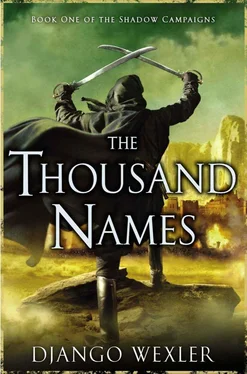Django Wexler - The Thousand Names
Здесь есть возможность читать онлайн «Django Wexler - The Thousand Names» весь текст электронной книги совершенно бесплатно (целиком полную версию без сокращений). В некоторых случаях можно слушать аудио, скачать через торрент в формате fb2 и присутствует краткое содержание. Жанр: Фэнтези, на английском языке. Описание произведения, (предисловие) а так же отзывы посетителей доступны на портале библиотеки ЛибКат.
- Название:The Thousand Names
- Автор:
- Жанр:
- Год:неизвестен
- ISBN:нет данных
- Рейтинг книги:4 / 5. Голосов: 1
-
Избранное:Добавить в избранное
- Отзывы:
-
Ваша оценка:
- 80
- 1
- 2
- 3
- 4
- 5
The Thousand Names: краткое содержание, описание и аннотация
Предлагаем к чтению аннотацию, описание, краткое содержание или предисловие (зависит от того, что написал сам автор книги «The Thousand Names»). Если вы не нашли необходимую информацию о книге — напишите в комментариях, мы постараемся отыскать её.
The Thousand Names — читать онлайн бесплатно полную книгу (весь текст) целиком
Ниже представлен текст книги, разбитый по страницам. Система сохранения места последней прочитанной страницы, позволяет с удобством читать онлайн бесплатно книгу «The Thousand Names», без необходимости каждый раз заново искать на чём Вы остановились. Поставьте закладку, и сможете в любой момент перейти на страницу, на которой закончили чтение.
Интервал:
Закладка:
Graff looked from Winter’s face to Bobby’s, uncertain. Then he shrugged.
“I’m no cutter, but I could wrap a splint. Did it break the skin?”
“Not that I saw,” Winter said.
“Should be all right, then,” he said. “It’s not likely to fester, anyway. I’ll need some clean cloth, and a length of board.”
Bobby left again to fetch the supplies, and Graff went to the pallet to examine the girl. He nodded approvingly.
“Looks like a nice clean break,” he said. Then, glancing at the tent flap, he lowered his voice. “Sergeant, are you sure you know what you’re doing?”
“No,” Winter said truthfully. “But you saw the camp, didn’t you?”
Graff shifted uncomfortably. “It’s war.”
“We heard her calling, and. .” Winter shrugged. “I couldn’t just leave her there.”
The corporal was silent for a long moment. “Fair enough,” he said, after a while. “The colonel said that we’re staying camped here for at least another day, for the sake of the wounded. Hopefully she’ll be well enough that we can turn her loose by the time we march.”
“Thank you, Graff.”
He colored slightly under his beard. “Not my place to question the sergeant’s decisions.”
Winter laughed, and Graff smiled.
“’Sides,” he said gruffly, “it’s us that should be thanking you. Every man of us. Even if most of those out there don’t know it, I do. If you’d let them keep running, we’d all have ended up on spits.”
Winter was taken aback. “I-it was just the right thing to do. You could have seen that as well as I did.”
“Should have,” Graff said. “But it was you that did it.”
She nodded awkwardly. The conversation was interrupted when Bobby returned, bearing a selection of boards and a spare sheet ripped into strips. Graff took these implements and set to work, rolling the girl onto her back and gently stretching her arm out along the pallet. Her eyelids flickered, and she moaned again.
“Folsom, hold her down,” Graff said. “Can’t have her shifting about on us. Sergeant, she’s going to scream. .”
Winter cast about, found one of her discarded socks, and wadded it up. Murmuring apologies, she pushed it into the girl’s slack mouth. Graff nodded and began his work. The flesh of the broken arm moved sickeningly under his fingers, and Winter had to look away. The girl’s jaw tightened on the sock, as though she wanted to bite through it, but she gave no sound. After a few moments, the procedure was done, and Graff was winding her arm round with linen.
“That should hold it,” he said. “If she starts to show fever, we’ll have to unwrap it and take a look. If it’s festered after all, then the arm will have to come off.” He caught Winter’s eye. “And don’t look to me for that .”
Winter nodded. “Thanks again.”
“It’s nothing.” He tied the linen off and got to his feet. “Now, if the sergeant will excuse me, I’ll be going back to bed.”
“Go,” Winter said. “All of you. Get some sleep.”
“What about her?” Bobby said. “Someone should watch her. What if she wakes up?”
“Hopefully she’ll have enough sense to stay quiet,” Winter said.
“Or she’ll slit your throat,” Graff said. “She’s a grayskin, after all’s said and done.”
Winter gave a tired shrug. “If you find me with my throat slit in the morning, you’ll know what’s happened.”
The three corporals grumbled a bit more, but in the end they left. Winter gathered the sheet and pillow from her bedroll to soften the hard earth, and stretched out. It was lumpy and uncomfortable, but she was asleep the instant her eyes closed.
• • •
Jane sat beside Winter on a long bench, watching Mrs. Wilmore lecture on the nature of charity.
Winter was afraid to turn her head. There were proctors prowling about, with sharp eyes and vicious switches. But she could catch glimpses of Jane out of the corner of her eye, red hair falling around her face like a curtain of dark crimson silk. She could smell her, even under the deep, earthy scent they all carried from working in the Prison gardens.
She could feel Jane’s hand on her knee, thumb rubbing tiny circles through coarse fabric. Inch by inch, the hand ventured higher, fingers exploring her thigh like mariners venturing into uncharted waters. Her skin pebbled into goose bumps, and her throat was tight. She wanted to tell Jane to stop, certain that at any moment she would hear the whistle of a proctor’s stick. And she also wanted to grab Jane by the shoulders, press her close-
“You still have it?” Jane said. Her fingers slid farther upward, Winter’s skirt bunching around them.
Winter risked turning her head, but Jane wasn’t looking at her. Her eyes were hidden by the fall of her hair.
“Do I have what?” Winter whispered.
“The knife,” Jane said, too loud. “You have to bring the knife-”
• • •
Light, filtered gray-blue through canvas. It took Winter a moment to remember where she was-not back in the Prison, nor back in the ravine, with Khandarai horsemen all around, but safe in her tent in the midst of the Colonial camp.
And not alone. She sat up from her improvised bed and immediately regretted it. Her body felt like a solid mass of aches and bruises, and the sweat and grime of the previous day had dried into a crust on her skin. She leaned forward, clutching her head, and groped for a canteen. The water was tepid, but it cut through the dust in her mouth.
The Khandarai girl lay on the bedroll beside her. She was exactly where they’d left her the night before, and so still it was a moment before Winter realized that she was awake. Her eyes tracked Winter, but other than that she didn’t move a muscle. It reminded Winter of a rabbit, paralyzed by the glare of a stalking fox. Winter cleared her throat and spoke in Khandarai.
“It’s all right,” she said. “We’re not going to hurt you.”
The girl seemed to unfreeze a little, but made no reply.
“How do you feel?” Winter indicated her own left arm. “Does it hurt badly?”
“Where am I?” the girl said.
Her speech had an almost musical lilt, and Winter was suddenly painfully aware of the grating inadequacy of her Khandarai pronunciation. She’d picked the language up in bits and pieces from books, once she’d taught herself to read the flowing Khandarai script, and she’d practiced in bars and on the street. Unconsciously, she’d adopted the accent, which meant that she sounded distinctly lower-class to Khandarai ears.
“In our camp,” Winter said. “This is my tent.”
“Camp,” the girl said. “The raschem camp.”
Raschem was “bodies” or “corpses,” Khandarai slang for Vordanai and other pale-skinned foreigners. Winter nodded.
The girl suddenly fixed her with a long stare. Her eyes were the peculiar purple-gray common among the Khandarai, which foreigners often found unsettling.
“Why?” she said. “Why did you bring me here?”
“We found you in. . the burned camp.” Winter groped for the words. “We did not want to leave you to die. Do you remember?”
“Remember?” The girl raised her broken, splinted arm. “I am not likely to forget. But I do not understand. Your soldiers were killing everyone. Taking the women first, and then-” Her gray skin paled. “Have you brought me to-”
“No,” Winter said hastily. “Nothing like that. I swear.”
“Then why?” The purple eyes were mistrustful.
Winter felt like she couldn’t muster a sufficient explanation in her native language, let alone pick her way through it in Khandarai. She changed the subject.
“My name is Winter,” she said. “Winter-dan-Ihernglass, you would say.” She mustered the politest language she had. “May I know yours?”
Читать дальшеИнтервал:
Закладка:
Похожие книги на «The Thousand Names»
Представляем Вашему вниманию похожие книги на «The Thousand Names» списком для выбора. Мы отобрали схожую по названию и смыслу литературу в надежде предоставить читателям больше вариантов отыскать новые, интересные, ещё непрочитанные произведения.
Обсуждение, отзывы о книге «The Thousand Names» и просто собственные мнения читателей. Оставьте ваши комментарии, напишите, что Вы думаете о произведении, его смысле или главных героях. Укажите что конкретно понравилось, а что нет, и почему Вы так считаете.











